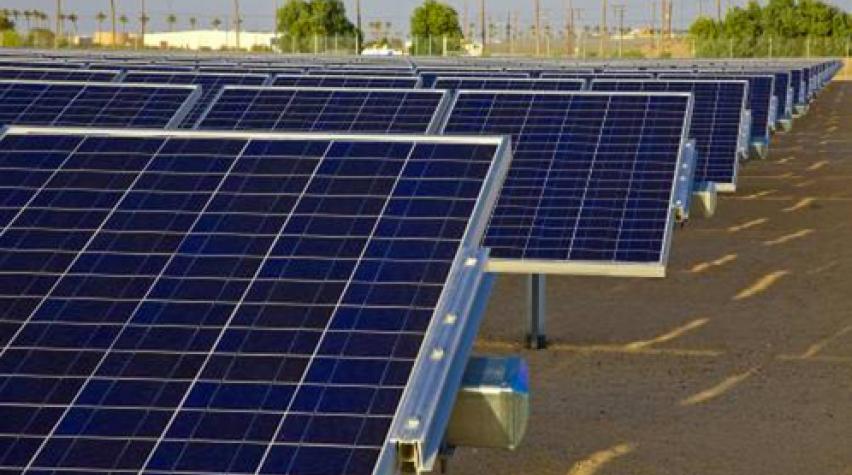
Last December, SunEdison, a major solar developer based in Maryland Heights, Missouri,announced that it would build a huge, fully integrated — from polysilicon to finished panels — $4 billion solar panel factory in India. This ambitious decision shows how quickly India's energy landscape has shifted just five months after Prime Minister Narendra Modi was elected last June.
Modi, who as the Minister of the state of Gujarat, has pushed aggressive, countrywide solar power targets. He has increased the government's 20 GW target to 100 GW, with the defense and the public sectors urged to set up mega-sized solar parks, relying on Indian-made equipment. This dovetails with Modi's "Make in India" campaign to persuade foreign companies to invest and manufacture in India. He wants to boost the economic growth that slumped to dismal 5% levels before he was elected Prime Minister. He also wants to increase manufacturing from 16% of GDP to 25% by 2025. Aiding this goal, the $4 billion factory will provide direct and indirect employment to over 20,000 people.
A full-spectrum factory
“The prime minister has been revising India’s aspirations for solar,” Pashupathy Shankar Gopalan, SunEdison’s managing director for South Asia and Sub-Saharan Africa, told Renewable Energy World. The factory “very nicely plays into the aspirations for the country to grow solar, as well as wanting to create more domestic manufacturing.”
SunEdison has wisely teamed up with the Adani Group, one of India's most successful infrastructure builders, power producers (and a Modi private sector favorite), to build the factory in Mundra, Gujarat. In the past, SunEdison has long been a manufacturer of silicon and wafers for making solar cells and chips, while outsourcing cell and panel manufacturing from low-cost vendors in China. This full-spectrum factory will increase the company's capabilities.
Under global pressure
With some of the fastest growing carbon dioxide emissions in the developing world, linked primarily to its coal power plants, India is also under pressure to join the fight against global warming. Modi will meet President Barack Obama in New Delhi this week, where they're expected to discuss climate issues, following last year’s trend-setting pollution cutting pact between the U.S. and China.
7.5 gigawatt capacity
The new factory, which will have an annual production capacity of 7.5 gigawatts, will incorporate every stage of production, starting with polysilicon, which will be processed into ingots, cut into wafers used to create solar cells, and finally assembled into panels. India is a good choice for this mega-factory because, while there may be a few local solar cell and panel makers, there are no suppliers of the building blocks of solar: the polysilicon ingots and wafers, and certainly not a global powerhouse like SunEdison.
SunEdison plans to roll out the factory in stages over three years and will eventually produce both multicrystalline and monocrystalline solar panels. Multicrystalline silicon cells are typically cheaper to make but can’t be as efficient at converting sunlight into electricity as the monocrystalline variety. The panel assembly will be completed first, allowing the factory to buy cells from third-party vendors and ship complete solar panels even before the entire factory is up and running. A best-case scenario has the factory rolling out those panels at the end of 2016.
Since SunEdison is one of the largest solar power project developers in the world, the new factory promises a reliable supply of solar equipment for its project development business.
A large project in Karnataka
In addition to SunEdison's new factory, Modi's "Make in India" campaign gained with SunEdison deciding to set up over 10,000 MW of renewable energy projects in India at a cost of over $10 billion. SunEdison also announced that it has signed a MOU with the state of Karnataka to develop five gigawatts of renewable energy over the next five years. The projects will provide enhanced access to electricity for many of the people in Karnataka, who currently have either no electricity or intermittent access to electricity. SunEdison also insists that these projects will be cost competitive with coal produced electricity, without subsidies or incentives.
Under the agreement, SunEdison will build a mix of solar photovoltaic (PV) and wind energy power plants across Karnataka. The state government of Karnataka will help SunEdison to find government land and will cut through enough red tape to connect the projects to the grid before December 31, 2016.
“We are proud to be working with the government of Karnataka to progress its renewable energy goals,” stated Pashupathy Gopalan. “Karnataka's comprehensive energy policy paves the way for socially and environmentally responsible economic growth and prosperity. The energy leadership in the state is determined to make a significant positive impact for the people and businesses of Karnataka, and we are excited about the opportunity to work with them to make this positive change."
Although the new factory will not be far from China, one of SunEdison’s big targets, the company has yet to decide whether it will use the solar panels from the new factory for its projects in China.


